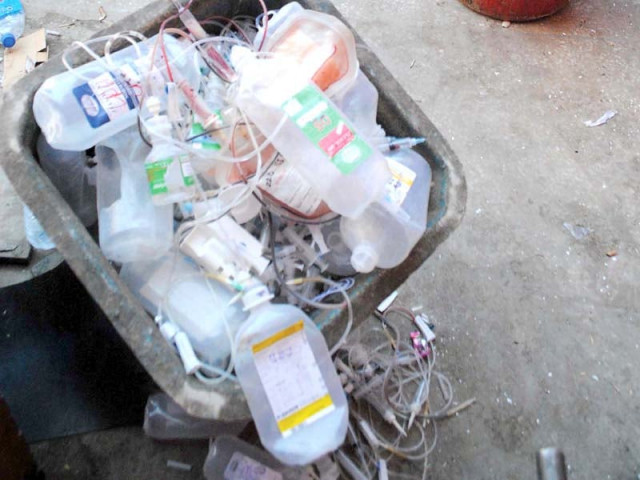Medical waste: What cures you may end up killing you
Experts stress need for better hospital waste management at UHS seminar.

The experts said that the unsafe disposal of healthcare waste, such as contaminated syringes and needles, posed a serious public health risk. PHOTO: EXPRESS/FILE
The management of healthcare waste requires increased attention and diligence to avoid the substantial disease burden associated with poor practice, including exposure to infectious agents and toxic substances, said experts at a seminar here at the University of Health Sciences (UHS) on Monday.
The experts said that the unsafe disposal of healthcare waste, such as contaminated syringes and needles, posed a serious public health risk. “Contaminated needles and syringes represent a particular threat as the failure to dispose of them safely may lead to dangerous recycling and repackaging which may lead to unsafe reuse,” one speaker said.
The seminar on ‘Strategic analysis and provision of new guidelines for the safe disposal of healthcare waste management’ was organised by the UHS Immunology Department in collaboration with the Environmental Health Protection Unit (EHPU), National Institute of Health, Islamabad.
Dr Jamal Nasir, the focal person for the EHPU, said staff, patients, and communities near hospitals were the most at risk from faulty healthcare facility operations. “These are mostly caused by not following infection control protocols, not using proper personal protective equipment, and not employing proper procedures for waste collection, transportation, storage and final disposal,” he said.

Proper management of healthcare waste and effective implementation of the Hospital Waste Management Rules of 2005 could minimise the risks both within and outside healthcare facilities.
Dr Nasir said that safety hazards in healthcare facilities were generally associated with handling of sharps (needles, cutters), gases, autoclaves, and other equipment. Open burning of hospital waste also posed safety risks for the staff carrying out this activity. These hazards included risk of cuts, pricks, gas poisoning, burning, and other bodily injuries.
“Strictly following standard operating procedures and protocols to handle sharps and proper use of equipment, particularly prick-proof gloves and masks, is of foremost importance,” he added.
Dr Ibrahim Mughal, technical officer at the EHPU, said that hospital waste management was deficient in many ways. There were no records and no one could be held responsible for the prevailing mismanagement. Waste materials were collected by sweepers who had no equipment or training to handle it properly.
The participants were told that the Hospital Waste Management Rules 2005 had been notified but were still be implemented in 70-80 per cent of hospitals through the formation of advisory committees and hospital waste management teams.
Hassan Nasir, manager of the waste management department at Shalamar Hospital Lahore, said that an estimated 80,000 tonnes of hospital waste was produced every month in the Punjab.
“Out of this, only 15 to 20 per cent of hospital waste is infectious in nature, but it is mixed with solid waste and thus contaminates the entire lot,” he said.
Around 2kg of waste per bed per day is produced out of which 0.1-0.5 per cent could be categorised as a health risk, Nasir added.
The incidence of hepatitis B and C has increased in the country, with the average prevalence of Hepatitis B ranging between 3 and 4 per cent (around 6 million people) and Hepatitis C at around 5 percent (7.5 million), he said.
Azmat Naz, deputy director of the Environment Protection Agency, said that the first priority was to segregate wastes, preferably at the point of generation, into reusable and non-reusable, hazardous and non-hazardous components.
Other important steps were the institution of a sharps management system, waste reduction, avoidance of hazardous substances, ensuring worker safety, providing secure methods of waste collection and transportation, and installing safe treatment and disposal mechanisms, she added.
UHS Immunology Department head Dr Nadeem Afzal and Prof Tahir Naeem from the microbiology department of Shalamar Hospital also spoke at the seminar.
Published in The Express Tribune, December 10th, 2013.



















COMMENTS
Comments are moderated and generally will be posted if they are on-topic and not abusive.
For more information, please see our Comments FAQ